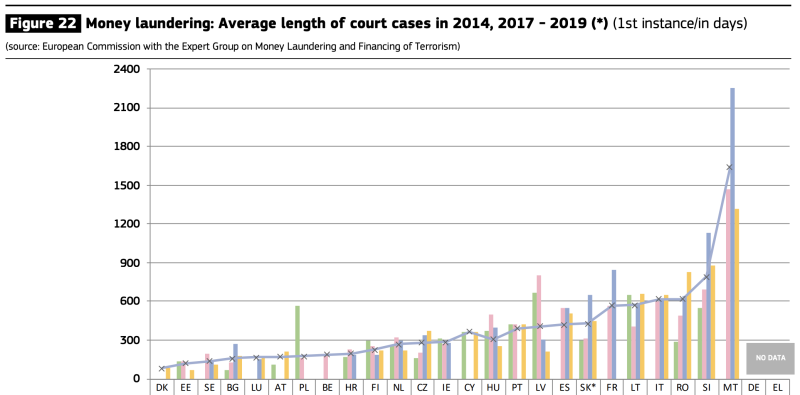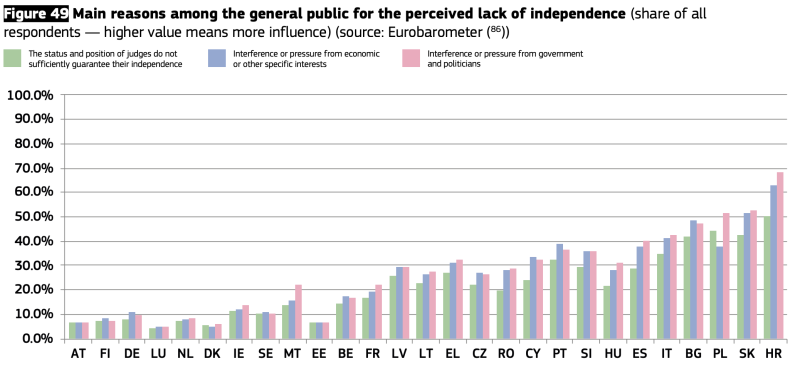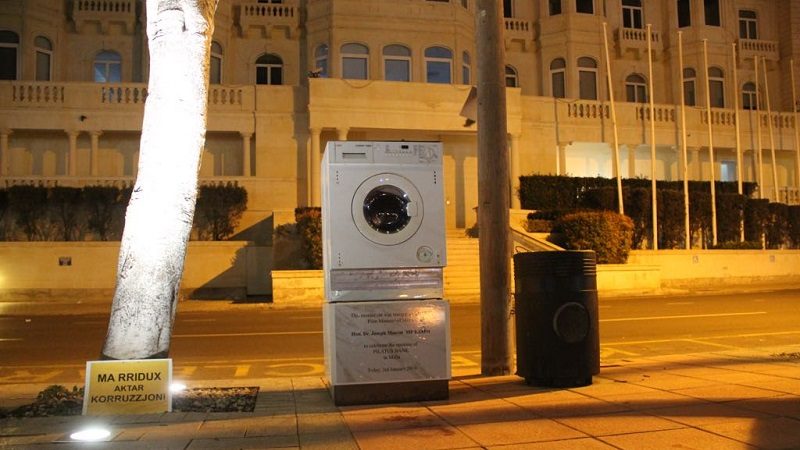Justice Minister Edward Zammit Lewis recently described the government’s extensive plans to upgrade Malta’s judicial system. Writing in an opinion column, he said these include investing further in digital technology, structural refurbishments, and an increase of 78% in funding to the office of the attorney general “to further equip this office with the necessary resources to address the current workload and to fight aggressively economic crime”.
This would be a welcome development given that to date, the average time it takes to conclude a money laundering court case in Malta continues to be the longest in Europe according to the latest EU Justice scoreboard report.
According to the data gathered for the years between 2017 and 2019, Malta continues to rank last among the 27 EU countries, with an average of 1644 days to conclude a money laundering case, followed by Slovenia (789 days) and Romania (620 days).
The latest data published in July by the European Commission shows that there has been no change from the previous year, and Malta continues to have overall some of the longest estimated times needed in order to resolve litigious, civil, and commercial cases at all court instances, topped only by Italy.

The average length of money laundering court cases in Europe. Source. EU Justice Scoreboard 2021
The Scoreboard shows that although efficiency improved or remained stable in 10 Member States, it also decreased in nine Member States between 2012 and 2019, before the start of the COVID-19 pandemic.
For the first time, the report also presented data about the perceived judicial independence by EU citizens and included new indicators such as the independence of national supreme court judges, the autonomy of prosecution services, and the independence of lawyers and bars.
Overall, the data suggests that there continue to be a number of challenges when addressing the perception of judicial independence across the bloc. In two-thirds of Member States, the perception of judicial independence by the general public improved, when compared to 2016. However, compared to last year, the public’s overall perception of independence decreased in almost half of the Member States.

Main reasons for perceived lack of judicial independence. Source: EU Justice Scoreboard 2021
The data collected by Eurobarometer and presented in the report shows that 48% of respondents in Malta rated judicial independence as “fairly good” and with only 9% rating it as “very bad”.
Among those who responded that they perceive a lack of judicial independence in Malta, 22% quoted interference from government and politicians as the main reason for their answer. This type of interference was the most cited reason across the 27 member states.
The 2021 edition of the Scoreboard also contains new figures on the types of digital technologies that are in place in the courts across the Member States, with Malta having a mixture of available digital technologies and secure electronic communication tools.
Most Member States provide citizens and businesses, or their legal representatives, with various degrees of online access to ongoing or closed cases in civil/commercial and administrative cases. Nevertheless, in criminal cases in the majority of Member States defendants and victims have very limited possibilities to follow or carry out part of their case using digital solutions, while in some Member States, including Malta, this possibility does not exist at all.
The EU Justice Scoreboard is an integral part of the EU’s rule of law toolbox and one of the sources of information for the Rule of Law Report since it provides the comparative data on the functioning of national justice systems, while the annual Rule of Law Report presents a qualitative assessment of significant developments related to the rule of law in all 27 Member States.
The Scoreboard does not promote any particular type of justice system. Whatever the model of the national justice system – or the legal tradition in which it is anchored – timeliness, independence, affordability and user-friendly access are some of the essential features of an effective justice system.
The full report and accompanying data can be accessed here.














Another blatant example of the reasons why Malta is on the FATF grey list, why 93% of the MEPs voted in the spring that they had no confidence in the Maltese authorities to uphold the rule of law, and why Pieter Omtzigt Rapporteur to the Moneyval Commission last December questioned why there had been no prosecutions brought against all the high profile figures implicated in one huge financial scandal after another.
Thank you for your continued efforts to expose the depth of depravity to which the country has reached and am confident we are nowhere near the bottom yet.